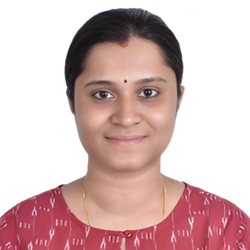
Parvathi N
Indraprastha Apollo Hospital, IndiaPresentation Title:
Fractionated Gyroscopic Radiosurgery for Optic Nerve Glioma: A Case Report and Review of the Literature
Abstract
Radiotherapy offers a favorable long-term outcome for the treatment of optic pathway glioma, but at a cost of neurocognitive impairment and decreased quality of life. This has led to a chemotherapy-first approach, deferring radiotherapy till disease progression. We present a case report wherein a 20-year-old female patient with left optic nerve glioma was treated with definitive radiotherapy using a self-shielding gyroscopic radiosurgery (GRS) system. We report the first published use of GRS in the treatment of optic nerve glioma.
The patient was treated with 15 Gy at the 56% isodose line in two fractions on alternate days with 17 isocenters and 271 non-coplanar beams, amounting to a total treatment time of 63 minutes. The evaluation of the treatment plan shows considerable sparing of the normal structures, which may translate into better long-term clinical outcomes. A clinical follow-up after a month of treatment showed good clinical control without any undue treatment-related toxicity. Further follow-up is slated as per standard protocol. This case report opens up the potential for considering GRS after careful scrutiny as a first-line approach in the treatment of optic nerve glioma.
Biography
Parvathi N is a final-year resident in Radiation Oncology at Indraprastha Apollo Hospital, New Delhi. She has a strong interest in advanced radiotherapy techniques, clinical research, and patient-centered cancer care. Passionate about innovation in oncology, she actively explores new technologies to enhance treatment outcomes. Her dedication to the field is reflected in her first published article in the Cureus Journal of Medicine, marking the beginning of her contributions to academic and clinical oncology.

